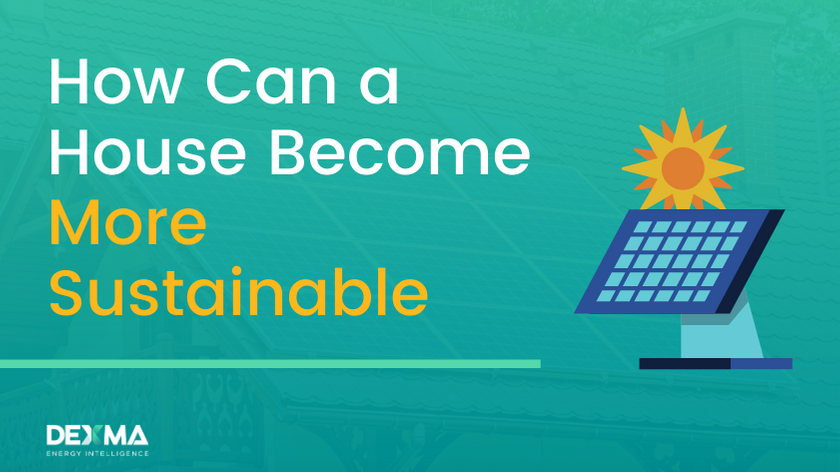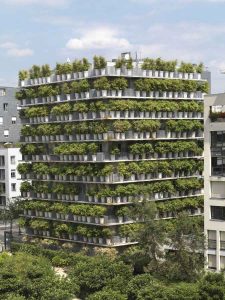Some years ago, thinking about the environment, and wanting to reduce our consumption of energy, were often frowned upon. People would call you a hippie, or try to make fun of your ecological endeavours. Of course, this was not the case for everyone, but being eco-friendly was definitely not so cool.
Luckily, with the amount of information freely available on the internet, and the possibility to stay connected with the rest of the world, awareness on the environment and its current state has increased, making much more people interested in making a positive impact on our planet.
That is, being eco-friendly and wanting to have a more sustainable house makes you cooler. But not only that, because adopting sustainable actions in our home can also yield lower bills from energy, heating/cooling, water, and many others. Making it actually hard not to want a more sustainable house.
What is sustainability in a house?
There is still some resistance in regards to dropping out habits that don’t generate the best output for the environment. Especially when it comes to making a house sustainable, because it might feel like the benefit to the environment is too low compared with the effort.
It might be true that in a city with one million inhabitants, only five homes actually adopting sustainability measures might not really represent such a big improvement for the environment. But these five homes might become ten, twenty, and so on; and end up really positively affecting the world.
The question might be, what is considered sustainability in a house, and this is a very important question; especially considering how different are conditions between countries, cities, and seasons; making it harder to find a single perfect answer for this.
For a home to be considered as sustainable, many are the actions that can be taken in order to accomplish this goal, and the best thing is that everything counts, so you don’t necessarily need to rethink the architecture of your house to start moving towards a positive change.
What really matters is for these actions to become habits or permanent solutions, rather than occasional things we do whenever we remember. That is the key of sustainability, a long term change or improvement that either reduces or removes the impact on the environment.
Specifically within a home, small or larger sustainability can be accomplished by developing habits or integrating systems that can help us to reduce our consumption of energy, get some or most of our electricity from a renewable source, use less propane, or even get a bike to go to work or to school sometimes instead of turning on the engine of the car.
Developing sustainable habits (for free)
It is true that some of the most effective methods to turn a house into a more sustainable home also require some investment, which can sometimes be a long-term saving, but which might feel a bit too pricey at first.
Many of these investments are really worth it, not only to contribute with the environment, but to reduce a certain expense in the house, such as reducing the use of heating, or even getting electricity from solar panels, which might even end up being the only source of energy.
But it’s understandable if some people are not sure about spending a certain amount of money right away, and it is a very respectable decision. However, this doesn’t mean there are not things we can do for free to help the environment. And they could even help us to save some money.
Some free habits we can start developing now to achieve sustainability at home are:
- Reduce the time of your showers
- Buy what you need and get the most out of your possessions
- Ride a bike or take public transportation whenever possible
- Make compost or give organic waste to someone who does make compost
- Turn off the air conditioning when you don’t need it
- Learn about natural alternatives to cleaning products
- Turn off your devices whenever you don’t need them
- Join an outdoor or group activity, especially one that is not so energy expensive
Many of these habits are not even directly related with the environment or with sustainability in mind. However, if developed long-term by many more people, they can really make all the difference, and help us ensure a better future.
Actions to actively make a house more sustainable
The previous list of habits that are pretty much free, with some of them even possibly helping us reduce our energy bills, is a great start if adopted by a good amount of people, and can help the environment a lot already.
However, it’s true that there exist several other actions that can be done by households, which can highly and positively contribute to the environment long term, and which can really turn a house into a highly sustainable place.
Some of these actions might need renovating the house, which not everybody has in mind, with good reason. But not all of them need so, and you might keep the ones that do for later, as we never know when renovation can take place, and we can take the opportunity to implement a new way to make our home more sustainable.
Let’s discover some of these actions:
- Insulating the house: If you live in a place with low temperature and very cold seasons, insulating the floor, walls and the ceiling are great ways to make heating more efficient, helping you to reduce the need for heating.
- Double-glazing windows: Just as insulating but for windows, this is a great way to further help heating to be preserved for longer, reducing energy consumption from heating systems.
- Choosing energy efficient light bulbs: These more environmentally-friendly types of light bulbs have got better as technology improves, and they are very long-lasting solutions that consume less energy. Making them great to help the planet and save money.
- Collecting rainwater: Especially for cities where rain is not a surprise, a rainwater collection tank can be a great way of saving water. It is clean water, and we can use it to water plants, as well as in several other ways.
- Planting green rooftops: This is a fantastic solution to help increase water retention and can actually reduce water run-off by 50–90%. This energy efficient action allows you to protect your building from direct solar heat in summer, and to lower heat loss thanks to its added insulation in winter. Energy conservation means fewer greenhouse gas emissions.
- Using renewable energy sources for electricity self-consumption: For new houses, there are many ways the sun can be used to get the most out of nature, by getting more sunlight into the house, reducing the need for lightbulbs, and even heating water with the sun.
It is true though that installing a system for generating renewable energy is not yet a possibility for people in many countries. But if you happen to be able to install solar panels (photovoltaic energy, also called PV), a small wind-turbine or a micro-hydro system, they are excellent ways of generating part of our electricity ourselves from renewable sources.
Having an Energy provider or Utility that uses renewable sources or green energy is another great way of helping. Check our mini guide to find the right energy plan.
We made you a short list of 5 stunning Green Buildings:
– The Endesa Pavilion, Barcelona, Spain
– The Crystal, London, United Kingdom
– The Flower Tower, Paris, France
– Kö-Bogen II commercial and office building, Düsseldorf, Germany
– La Fàbrica del Sol, Barcelona, Spain
Of course, the previously discussed habits remain as important for the long-term positive impact in the environment we are looking forward to, since the change should come from ourselves first.
Making our houses more sustainable is something that we all can achieve, no matter where we start, as long as we never forget that the change starts with ourselves, and that no matter how small of a step we give, if that step is repeated by many, we’ll be millions of steps closer to a more sustainable and efficient future.
If you want to keep up with the latest “energy” news, we invite you to subscribe to the most innovative Energy Efficiency blog on the web:






